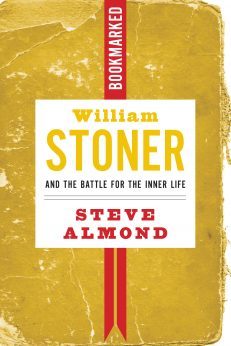Memoir, Novels, Lives and the Quality of Our Attention
July 17, 2019 § 11 Comments
 In William Stoner and the Battle for the Inner Life, Steve Almond discusses a book that changed his life—John Williams’ 1965 novel Stoner—and argues that novels are not merely books, but instead “manuals for living.”
In William Stoner and the Battle for the Inner Life, Steve Almond discusses a book that changed his life—John Williams’ 1965 novel Stoner—and argues that novels are not merely books, but instead “manuals for living.”
Almond never disappoints: his prose is always powerful, provocative. He is a respected teacher and literary advocate. He is funny. He is generous.
So we tracked him down to ask a few questions about his idiosyncratic book-about-a-book and Steve’s prolific, wide-ranging writing life.
Here we go:
Dinty W. Moore: You write in your book that prior to encountering the novel Stoner, you “assumed the point of literature was to document the lives of the driven and depraved, the lawless and lust-riven, in short: the memorable… It hadn’t occurred to me that the story of every life is, from a cosmic perspective, one of obscurity. You are alive for some brief span, then you die.”
Is this a revelation limited to the fiction writer side of you, or did it influence your view of, and writing of, memoir and nonfiction over the years?
Steve Almond: Yeah, that line “You are alive for some brief span, then you die” is vintage Almond — you can hear the guy making a rather desperate play for the Beach Read crowd.
What I’m saying here applies to all genres of writing, and more broadly to all human endeavor, to the delusion that we can achieve “immortality” by means of our ambitions. The truth is, most of the meaning we find and create in our life comes in the private moments during which we seek to pay attention (and therefore love) the people around us, not in our striving public deeds.
I’m not trying to depress people here. I’m simply trying to get Americans in particular to pull their heads out of their asses, to abandon the ridiculous idea that a life is worth living, or regarding, if it involves public acclaim, the killing of many people, the accumulation of great wealth and power, the fucking of a celebrity, etc. We’re really lost as a culture. How else could we wind up with such a cruel and vapid leader?
That’s why Stoner registers to me as a revolutionary book. It posits the perfectly absurd notion that what ranks as heroic and redemptive is the act of bearing witness to your life. Stoner suffers a great deal in his life. He betrays his parents and never forgives himself. His marriage is a failure. He fails as a father. His career goes nowhere. By the math of the obituary, he’s a nobody, a never was. But at the same time, he leads a life of deep meaning. He rescues himself from a life of agricultural servitude. His soul is awakened by literature. He works very hard to be a good teacher, to transmit love and attention to his students. He experiences a transcendent passion.
And thus, at the end of his life, he’s able to silence the voice within himself (within all of us) that says: Hey, you were a failure. He never amounted to much. Nobody took notice. He delivers this remarkable line, maybe the most hopeful line in all of literature:
He dimly recalled that he had been thinking of failure—as if it mattered. It seemed to him now that such thoughts were mean, unworthy of what his life had been.
Omigod. You guys. That’s what I want to feel at the end. Hell, it’s what I want to feel every minute of my life.
Dinty: You mention the “swamp of reality television” and a mania that has infiltrated our literary culture, “with agents and editors stalking ‘larger than life’ stories ripe for cross promotion” alongside “our hunger for sensation and narcissistic reward, our readiness to privilege action over contemplation. Our tireless compulsion to be known by the world rather than seeking to know ourselves.” Though I don’t think you mean it this way, some of what you say here echoes recent critics of the memoir, especially those who question modern trauma narratives. What about this? What would the novelist John Williams have to say about the various memoir controversies and dust-ups of the past decade or so?
 Steve: The point of Stoner—or at least one of the central points—is that what matters isn’t the quality of a particular life, but the quality of attention paid to that life. That’s what marks any piece of autobiographical work as special, from St. Augustine to Knausgard to Didion to Laymon. It’s the author’s attention to his or her own experience, and their determination to go beyond self-regard into the more dangerous and thrilling province of self-reflection.
Steve: The point of Stoner—or at least one of the central points—is that what matters isn’t the quality of a particular life, but the quality of attention paid to that life. That’s what marks any piece of autobiographical work as special, from St. Augustine to Knausgard to Didion to Laymon. It’s the author’s attention to his or her own experience, and their determination to go beyond self-regard into the more dangerous and thrilling province of self-reflection.
What I’m talking about in regards to reality TV, or “larger than life” stories is the voice of the marketplace, the absurd (and again, quintessentially American) idea that what makes a life worthy is some garish “hook.” It’s this kind of capitalist pressure that induces writers such as James Frey to lie to the reader, to gin up drama by making up stuff that didn’t happen to them, or by causing authors to lie about their own identities and experiences.
The entire point of Stoner is that every human life is full of remarkable drama, because every human being comes equipped with an inner life, a set of yearnings and fears and confusions that are concealed from the world and yet persistently, unavoidably, experienced. It is the mission of all art, but literary art in particular, to engage with this inner life.
The problem with fake memoirs is simply that the writers are lying to their readers. Because the definition of creative nonfiction really isn’t that complicated, in my view. It’s a radically subjective version of events that objectively took place. The moment you start making stuff up you’re engaged in the making of another kind of writing: fiction. Which is just wonderful. But you can’t bullshit the reader about what you’re up to.
Because your readers are all you’ve got. They are your allies, your collaborators. You owe them clarity and you owe them truth. There’s no need to pander to the lesser parts of them, to chase ambulances or flog the language for beauty. Pursue the truth–tenderly, ruthlessly–and the residue of that pursuit is beauty.
__
Dinty W. Moore founded and continues to edit Brevity and the Brevity Blog.

Yes, please.
Never said better.
“The point of Stoner—or at least one of the central points—is that what matters isn’t the quality of a particular life, but the quality of attention paid [by the individual] to that life.” It is an interesting perspective.
This strikes me as a meditative and zen-like way of looking at memoir. Validation of our lives that come from within, not from the outside world. Every life is worthy of contemplation.
yes!
As the twin tsunamis of societal success and failure continue to swamp my existence, this is a desperately needed breath of air. Thank you.
So thoughtful. Thank you.
Looking forward to reading this book – love how Steve’s mind works, and curious about Mr. Stoner.
This needs to be taught in every school.
[…] experiences in the same MFA program I graduated from just a year or two before he entered. Reading this interview, I was swept with a wave of longing to reread both books immediately. Happily, I have a long day of […]
[…] via Memoir, Novels, Lives and the Quality of Our Attention — BREVITY’s Nonfiction Blog […]